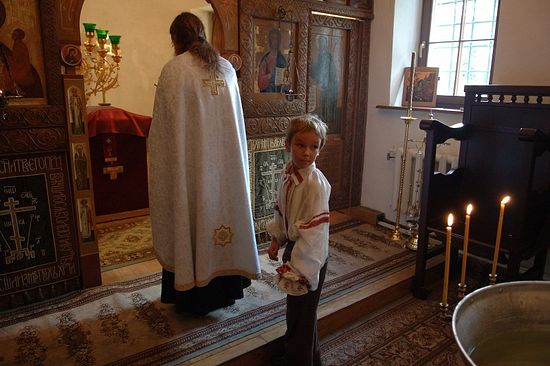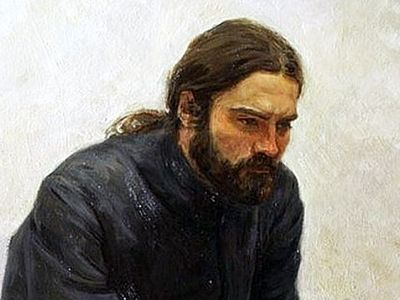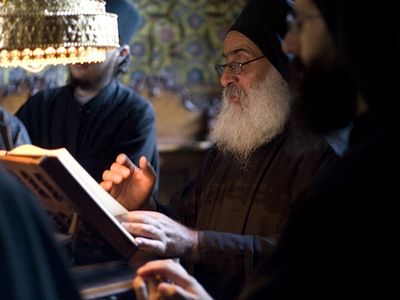A Prayer given by God

What else can be said about prayer? There is prayer made by man, and there is a prayer granted by God to a praying man. Who has not known the former? You should know the latter as well, at least in its initial form. When a man begins turning to God, his first duty is a prayer. He begins to go to church, and at home he reads prayers from the prayer book and by heart. But his thoughts get distracted and he cannot control them. However, the more he works on his prayers, the more balanced his thoughts become, and his prayer becomes clearer.
And yet, the soul’s atmosphere will not be cleansed until it is ignited with a small light of spirituality. That light is a token of God’s grace, but it is granted to all—not only to the chosen. That light appears as a result of a certain state of purity in the entire moral system of the seeker. When that light is ignited, and the heart harbors constant warmth, it stops the turmoil of thoughts. The soul experiences what happened to the woman with an issue of blood: And immediately her bleeding stopped (Luke 8:44). In that state, prayer turns to a greater or lesser extent into ceaseless prayer. The prayer of Jesus serves as a medium to that ceaseless prayer. And that is the boundary line to which prayer made only by the person can go.
The next stage of that state is when prayer overcomes a person, and was not created by him. The prayerful spirit captivates a person and carries him into his heart, as if somebody had taken him by the hand and made him go from one room to another. The soul is bound there by some external force and stays willingly inside while it is overcome by the Spirit that captivated it. I know two degrees of that captivation. In the first, the soul can see everything; it perceives itself and its external position consciously, it can reason and control itself, and even destroy that state, if it wishes.
The Holy Fathers, especially St. Isaac the Syrian, described also another stage of the prayer given from above, or overcoming a person. At that stage, the soul is also overcome by the prayerful spirit, but it is carried to such contemplative spheres that it forgets its external position, it does not have the power to reason, control or destroy that state, but only to reflect. Such a state is mentioned in the "Otechnik" [Patericon], where a case is described of a person who began praying before dinner and came to himself only in the morning. This is exactly what we call a prayer in rapture, or a reflective/contemplative prayer. In such a state, some have been surrounded by light or their faces illumined, and some have been lifted from the ground. Holy Apostle Paul was taken into heavens in that state.
Clarification of some difficult points
You wrote, "My praying by the prayer book has gotten worse." — This is not a loss: even if you never pick up the prayer book again. A prayer book is something like a phrase book of French, for example. You memorize dialogues until you can fluently express yourself, and after learning to speak you forget those phrases. In the same manner, we need a prayer book until the time comes when the soul itself begins to pray, after which we can lay the prayer book aside. Although, when your own prayer is not proceeding freely, it would be good to set it in motion by praying from the book.
You should fear fascination. It happens to those who grow proud, who think that since they feel warmth in their hearts, it means they have achieved ultimate perfection. However, this is only the beginning, and an unstable beginning it is; for the warmth and satisfaction in the heart can also be of natural origin—the result of heartfelt mindfulness. But one must work and work, wait and wait, until what is natural is replaced with what is granted by God’s grace. We should never consider that we have achieved anything, but rather we must see ourselves as poor, naked, blind, and good for nothing.
You complain of your prayer being meager. But you can pray not only standing in front of icons, since any ascension of your mind and heart to God is true prayer. And if you do that while doing something else, it means you are praying. St. Basil the Great treats the matter of the Apostles’ remaining in unceasing prayer the following way: no matter what they were doing, they were thinking about God and living in permanent devotion to Him. That state of their spirituality was in fact their unceasing prayer. Here is an example. As I have earlier written to you, different demands are made upon working people and those who live idly at home. The main concern of busy people is not to allow wrong feelings while they are doing their job, and to try to devote all their feelings to God. This devotion will then turn into prayer. We read that Abel’s blood cries out to God. In the same way, everything we do in devotion to God, cries out to Him. Someone once sent a dish of food to an elder, who said, "It smells terrible!" But the food was very good, and fresh. They asked him, "Why?" He explained that it was not sent by a good person, and not sent with good feelings. People whose feelings are refined feel this. Thus, apparently, as a good smell comes from good flowers, so do good things done with a good disposition emit an aroma, which rises like incense during church services.
You write about a spiritual dullness of the senses in prayer. That is a great loss! Take the trouble to wake up your feelings. Our chores are only an excuse for shortening the time allocated for prayer, and not an impoverishment of internal prayer—the latter is unpardonable. You can please God with little, but that little should come from your heart. Lift up your mind to Him and say with repentance, "O Lord, have mercy on me! O Lord, bless me! O Lord, help me!" This is a prayerful cry. And if the feeling for God is revived and established in your heart, then that will be an unceasing prayer without words, and without standing and reading prayers in front of the icons.
Is your conscience troubled because you say prayers hastily? That is justifiable! Why do you listen to the Enemy? He is the one who spurs you on. "Make haste, hurry up," he says. That is why you do not sense any fruits from your prayer. Make it a rule for yourself to take your time and to say every word of the prayers with understanding, and if possible, with feeling. Assume this task as resolutely as a commander-in-chief who does not bear any objection. The Enemy would suggest: you need to do this or that; but you should just say to yourself, "I know that without your seduction. Off with you...." And then you will see how successful your prayer will be. Otherwise you have only the prayer rule, but not the prayer itself. It is only prayer that nourishes your soul.
You should check by the clock the length of time devoted to prayer said slowly, and you will see that you spent no more than several minutes. But hasty prayer brings much harm.
When a bad thought suddenly occurs to you, it is an arrow shot by the Enemy. He shoots it trying to distract you from the prayer and to occupy your mind with worldly things. If you start concentrating on that thought, the Enemy will begin contriving various tales in your mind to sully your soul and to incite bad, passionate feelings. That is why there is one ruling guide in this case: Cast that thought away quickly and return your attention to the prayer.
Do all our prayers reach God? — A prayer is never wasted, regardless of whether or not the Lord grants us what we ask. Because of our ignorance, we often ask for something that would bring us harm instead of benefit. Not fulfilling that plea, the Lord wills to grant us something else for our work of prayer, and He wants to do it inconspicuously. That is why there is no sense in such utterances as, "You are praying to God, but what have you gotten for it?" The person praying is asking God for a specific thing. If God knows that the fulfillment of that supplication would eventually be to the person’s detriment, He does not grant the wish and thus does him good; for if He had fulfilled that supplication, it would have done him much harm. Beware of the snares all around you in this deceitful world!
On the Jesus Prayer
From time immemorial, ardent Christians repeated short invocations to God so that they might pray unceasingly, and drive away idle, wandering thoughts. These were prayers were various. Saint John Cassian said that in Egypt, all Christians would say, "O God, help me, O Lord, grant me your help." St. Joanicius repeated constantly, "My hope is the Father, my refuge is the Son, my shelter is the Holy Spirit; O Holy Trinity, glory to Thee." Someone else would say, "As a man, I have sinned, but as the bountiful God, have mercy on me."
Certainly, there were other similar short prayers. With time, the Jesus prayer became established and widely used by everyone: "Lord Jesus Christ, Son of God, have mercy on me, a sinner." The aim of this prayer is the same as for the others: to keep one’s mind turned to God. At the same time, one must remember that saying the Jesus prayer is only a tool or activity that shows our strong desire to find the Lord.
Everyone would benefit from saying the Jesus prayer. Those in the monastic rank must repeat it at all times. So there is no danger in the prayer itself, if one says it reverently. What is dangerous is "artistry" (i.e. some artificial tricks) invented to accompany the prayer. For example, while saying the Jesus prayer, some people put their hand on the table and concentrate their attention under the fingers; This is an inconsistent oddity. Or here is yet another such whim: striking the finger of your right hand against the palm of left one and in this way, attempting to concentrate the mind on the prayer.
The first person to write about the "artistic" repetition of the Jesus prayer was St. Gregory of Sinai in the thirteenth century. Tricks like these plunged some people into a dreamy state of enchantment, while others, strange as it sounds, into a constant state of lust. That is why those tricks should be disapproved and condemned resolutely. And we must urge and teach everyone to revere the sweetest name of the Lord in a simple, heartfelt way.
The essence of a prayer is easy to explain. Make your heart and mind stand before the Lord and appeal to Him, saying, "Lord Jesus Christ, Son of God, have mercy on me, a sinner." That will be your prayer work. The Lord will see who prays devotedly and will grant him spiritual prayer according to his zeal. That spiritual prayer is in fact the fruit of the grace of the Holy Spirit. This is all we should say about the Jesus prayer. All those other inventions have nothing to do with it: they are the Enemy’s attempts to distract us from prayer.
Conclusion
So, the essence of prayer consists in attentively addressing God and appealing to Him with a warm heartfelt feeling—whether you are expressing your gratitude, repentance or something else in your prayer. If there is no such feeling, then there is no real prayer.
In order to learn how to pray, pray more often and more zealously and you will learn it. You will not need anything else. If you work hard and patiently, with time you will acquire the skill of unceasing prayer. Make it your goal—to seek it, and do seek it. The Lord is near you. Keep God always in your mind and always try to see the Lord before you, and to venerate Him.
When interfering thoughts come to your mind during prayer, drive them away. If they persist, banish them again… and be that way in everything. This is an act of sobriety. Exert yourself to keep your heart in a religious spirit. When your heart is overcome with a feeling, vain thoughts do not bother it.
We began writing with an effort, and the wish to do this work properly. In the same way, we have to learn how to pray through effort and persistence. Prayer will not come by itself—you have to learn it, as if you were rubbing your soul to warm it up. When the warmth comes, your thoughts will calm down, and your prayer will become pure. Everything comes through God’s grace. That is why we have to pray to the Lord for Him to grant us prayer.
As far as the prayer rule is concerned, you can choose any of them as long as you are keeping your soul in reverence for God.
It would be good to get used to appealing to God with short prayers during the day. The main prayer out of all of them is the Jesus prayer: "Lord Jesus Christ, Son of God, have mercy on me, a sinner." Learn the twenty-four prayers of St. John Chrysostom and pray to God with them. Using short prayers concentrates your attention and reviews all your spiritual needs.
Do not forget that the strength of the prayer is the "contrite spirit”; that is, the state of a heart filled with repentance and humility. Commit yourselves to the hands of God and He will never leave you. While praying, you should not try to visualize God or the Mother of God, nor the saints, angels, or any other visions, but just pray being sure that God and the saints hear your prayer. How can they hear it? What use is there in discussing that? They just hear it—that’s all. If you start creating various images in your mind, the danger arises of praying to some fantasy. How can we visualize something that we have never seen? Moreover, the state in which the saints abide in that other world is so different from anything familiar to us that all our visualizations are doomed to be fraudulent and false. That is why we should get accustomed to saying prayers without creating any images in our minds.





